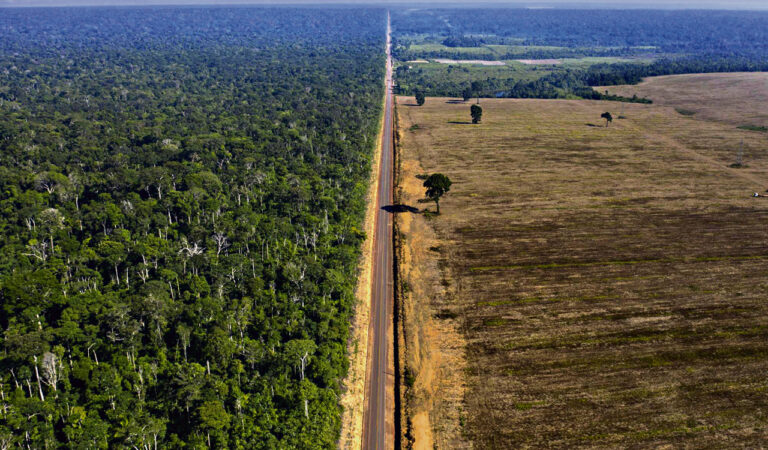Jair Bolsonaro has quietly collaborated in the destruction of more than 33,000 square kilometers of the Amazon rainforest during his rule, bringing it almost to “tipping point”
Release Date – 12:40 AM, Mon – 12 December 22

Exploited part of Amazon fuels Brazil’s economy, balancing will be challenging
Amitava Mukherjee
Of the many crucial tasks that Lula De Silva, the newly elected Brazilian President faces, saving the Amazon forest should top the list. He is also aware of the importance of the Amazon forest to human survival. He also pledged to monitor the entire Amazon forest and stop deforestation.
But what’s really going on in the Amazon rainforest, which covers 5.5 million square kilometers across different countries in Latin America. It accounts for half of the world’s remaining tropical rainforests. Sixty percent of the rainforest is in Brazil, where deforestation was rampant under the country’s former president, Jair Bolsonaro, under the auspices of the state. The Amazon rainforest is 10 million years old and has 390 billion trees. This forest stores up to 120 gigatons of carbon, equivalent to nearly 12 years of global emissions at current rates.
Bolsonaro’s “legacy”
If deforestation is allowed to continue, much of it will enter the atmosphere, making global warming all but uncontrollable. Nearly 300 tribes still live in Brazil’s forested areas, and their livelihoods are also threatened by deforestation.
Bolsonaro came to power in 2019 at the height of a national recession and a government corruption scandal. His campaign promise is to turn the Amazon forest into Brazil’s “economic soul” and open up the virgin forest to agribusiness giants, mining companies and developers. He has effectively waged a “jihad” against indigenous tribes with certain traditional rights that go a long way toward protecting the forest. Bolsonaro has declared that not a single square centimeter of land in the Amazon will be designated to tribes.
Bolsonaro is not stopping there. IBAMA, the law enforcement arm of the Brazilian Ministry of the Environment, was targeted by him. He has intervened frequently to block the agency’s actions against logging, fired 21 of the agency’s 27 governors and created a new agency that bypassed IBAMA. While Lula’s first term as president saw an 80 percent reduction in deforestation in the Amazon, Bolsonaro’s first eight months in power in 2019 resulted in a 92 percent increase in deforestation compared to the same period in 2018. This is the computational agency done by the Brazilian Space Research Center INPE. To defend the data, the head of INPE was fired by Bolsonaro.
commercial planting
But Lula’s path forward will not be easy to negotiate. He will have to strike a balance because the bare parts of the Amazon rainforest — 19.8 percent of Brazil’s rainforest, mostly in the south and east — has been stimulated by commercial plantations and ranching of the Brazilian economy. Brazil is now a major supplier of animal protein to much of the world (mainly Asian and African countries), most notably China.
A Time magazine report calculated that 427 species of mammals live in the Amazon forest today, the largest of which are cows raised on badlands — 80 percent of which are used for pasture — butchered and then exported. In 2018 alone, Brazil earned $6 billion from beef exports, the same report said. Even small traders in the industry are now finding it profitable to clear much of their land and raise cattle, even though under current environmental laws they must keep 80 percent of their land under forest cover.
Agribusiness Hall
Lula da Silva may have to clash with the agribusiness lobby as he claims to work to stop the looting of Brazil’s Amazon. This is the greatest challenge before him. The agribusiness lobby will stop at nothing to bring Amazon into the world’s food supply chains, especially soy and meat. About 80 percent of soybeans grown worldwide are fed to livestock, especially broiler chickens. Chickens are so intensively farmed in Europe, especially the UK, that a billion of these hapless birds are slaughtered every year in the UK alone. The UK imports 3.5 million tonnes of soybeans a year to feed chickens, about a quarter of which comes from Brazil, according to investigative news portal Unearthed. Needless to say, they were grown on bare Amazonian soil.
According to Progress International (PI), a left-wing international activist group, many of the biggest names in the world of multinational banks and investment funds are emerging who may indirectly finance agribusiness, which in turn fuels the destruction of agriculture. Brazilian Amazon forest. Most of these notables hail from the global north. In order not to fall behind the Brazilian banks, state-owned and private investment funds are also financing these companies that clear the rainforest for commercial purposes.
Lula da Silva, therefore, has a difficult task on his shoulders.Bolsonaro has quietly watched and worked with the destruction of more than 33,000 square kilometers of the Amazon rainforest during his rule, bringing it almost to the “tipping point” where the forest no longer sucks groundwater and releases it into the atmosphere The ghosts in the game create clouds and bring rain, slowly turning large forests into savannah-type lands

(The author is a senior reporter and commentator)
